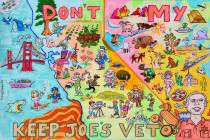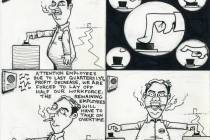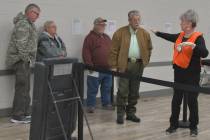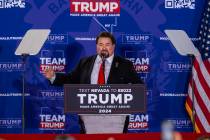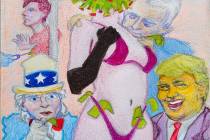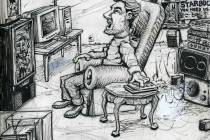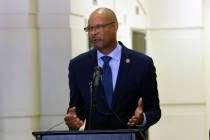What are early caucuses getting Nevadans?
In 2006, the Democratic National Committee slated Nevada and South Carolina for new, and very early, berths in the Democratic schedule for presidential primary and caucus states. Initially, the plan was for Nevada to go after Iowa's caucuses and before New Hampshire's primary, but New Hampshire wasn't going to put up with that and so Nevada caucuses and the South Carolina primary went after New Hampshire and Iowa but before all other states.
When Nevada was campaigning for that early slot, party officials from Nevada circulated a 40-page prospectus singing the state's praises to members of the national committee and other opinion leaders: "Nevada is an outstanding selection as an early caucus state because it possesses the benefits of retail politics found in Iowa and New Hampshire. At the same time, it equally highlights other key electoral factors such as union density, racial and geographical diversity, and most of all, the ability to deliver electoral votes to the eventual Democratic nominee. With one of the highest union densities in the nation and the highest in the Western region, Nevada will provide an opportunity to discuss issues important to working families across the country. ... An earlier push and more attention to core party and Western issues could make the difference in the next presidential election – not only in Nevada but in the Western region."
There were a lot of those kinds of predictions that western issues would come to the fore. I made some of them myself ("Nevada gets early caucus," Aug. 20, 2006, Las Vegas Review-Journal). "Western issues will be more in focus than they have been in the past," Colorado political consultant Mike Stratton told the Los Angeles Times. Those predictions gained force when Nevada Republicans decided to join the Democrats on the early date.
Well, here we are on the eve of the third round of early Nevada caucuses, and I am unable to remember much discussion of Western issues. Candidates usually commit themselves on Yucca Mountain and otherwise talk about the same issues they do elsewhere.
Occasionally an individual candidate will take up some local issue, as Ben Carson did this year with public lands, but there has not been the exploration of western issues across the breadth of the Republican and Democratic candidate fields. (Rand Paul's secret meeting with Cliven Bundy might have prompted some useful discussions, but no one – including other candidates – didn't seem to want to talk much about it.) How often have they all discussed the western drought and climate change, grazing fees, the mining law of 1872? This year, the Democratic candidates engaged on rooftop solar because it blew up in the final stretch in the national financail media, but even then the Republicans ignored the issue.
In the first early Nevada caucuses of 2008, with no incumbent president, both parties had a large fields of candidates (Democrats: Bayh, Biden, Clinton, Dodd, Edwards, Dodd, Gravel, Kucinich, Obama Richardson, Vilsack; Republicans: Giuliani, Hunter, Huckabee, Keyes, McCain, Paul, Romney, Thompson) and getting them to talk about western issues was like pulling teeth. In the months before the Nevada caucuses, I sent out questionnaires to all the candidates and then browbeat the campaigns incessantly to get them returned. My newspaper ran three cover stories in advance of the caucuses, two of them on the candidates' positions on local issues. We editorialized, "But in the end, we got answers from five of eight Democrats and two of eight Republicans. Perhaps most disappointing was the lack of response from candidates who are all about issues, like Dennis Kucinich and Ron Paul. Paul's office asked us for an extension of time, which we granted. We never heard from them again, though we tried to make contact five times."
Journalists didn't do much better than candidates. They tended to emulate national reporters with a focus on money or polls and who was ahead, not on issues.
This was particularly distressing for a caucus state like Nevada. Caucuses are more deliberative than primary elections. People sit and talk with people from their neighborhoods about candidates, swapping information and trying to select the best candidate their party can provide to the November electorate. If all the candidates and reporters can give them is pretty much what the voters in other states are getting, what is this early start getting Nevadans?
Dennis Myers is an award-winning journalist who has reported on Nevada's capital, government and politics for several decades. He has also served as Nevada's chief deputy secretary of state.







